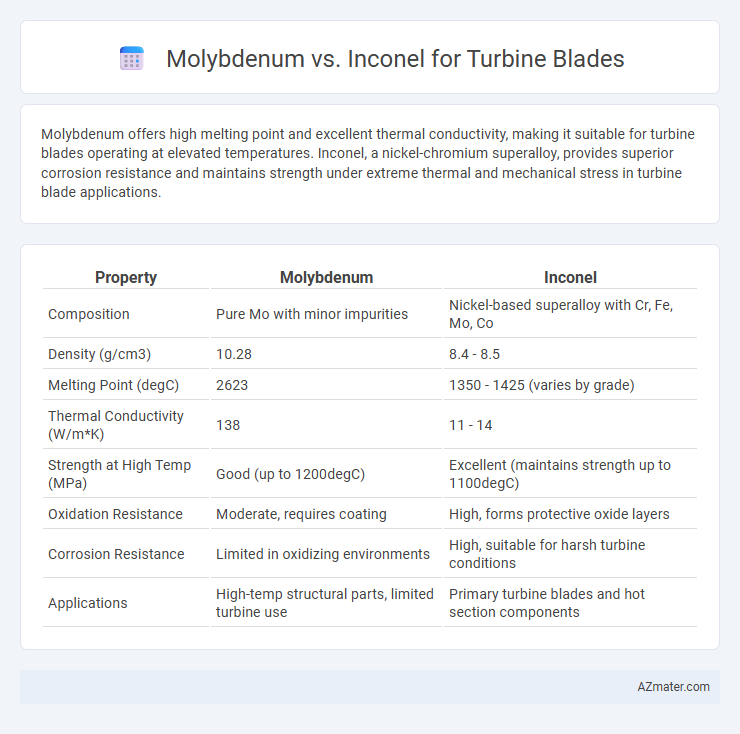Molybdenum offers high melting point and excellent thermal conductivity, making it suitable for turbine blades operating at elevated temperatures. Inconel, a nickel-chromium superalloy, provides superior corrosion resistance and maintains strength under extreme thermal and mechanical stress in turbine blade applications.
Table of Comparison
| Property | Molybdenum | Inconel |
|---|---|---|
| Composition | Pure Mo with minor impurities | Nickel-based superalloy with Cr, Fe, Mo, Co |
| Density (g/cm3) | 10.28 | 8.4 - 8.5 |
| Melting Point (degC) | 2623 | 1350 - 1425 (varies by grade) |
| Thermal Conductivity (W/m*K) | 138 | 11 - 14 |
| Strength at High Temp (MPa) | Good (up to 1200degC) | Excellent (maintains strength up to 1100degC) |
| Oxidation Resistance | Moderate, requires coating | High, forms protective oxide layers |
| Corrosion Resistance | Limited in oxidizing environments | High, suitable for harsh turbine conditions |
| Applications | High-temp structural parts, limited turbine use | Primary turbine blades and hot section components |
Introduction to Turbine Blade Materials
Turbine blade materials demand exceptional strength, high-temperature resistance, and corrosion resilience to withstand extreme operating conditions. Molybdenum offers excellent thermal stability and oxidation resistance, making it suitable for high-temperature environments, whereas Inconel, a nickel-based superalloy, excels in mechanical strength and resistance to thermal fatigue and corrosion. Selecting between molybdenum and Inconel depends on specific turbine performance requirements, with Inconel often preferred for its superior durability in aggressive thermal and oxidative settings.
Overview of Molybdenum Properties
Molybdenum offers exceptional high-temperature strength and excellent corrosion resistance, making it suitable for turbine blade applications requiring durability under extreme conditions. Its high melting point of approximately 2,623degC and low thermal expansion contribute to stable performance in thermal cycling environments. The metal's ability to maintain structural integrity at elevated temperatures enhances turbine efficiency and prolongs blade lifespan compared to conventional alloys.
Key Characteristics of Inconel Alloys
Inconel alloys, primarily composed of nickel, chromium, and iron, exhibit exceptional high-temperature strength and corrosion resistance, making them ideal for turbine blade applications. Their ability to maintain structural integrity in extreme thermal and oxidative environments surpasses that of molybdenum, which, while strong, is more prone to oxidation at elevated temperatures. The superior creep resistance and oxidation stability of Inconel alloys ensure prolonged turbine blade durability and performance in harsh operating conditions.
Strength and Performance at High Temperatures
Molybdenum exhibits excellent high-temperature strength and creep resistance, making it suitable for turbine blades operating in extreme thermal environments up to approximately 1100degC. Inconel, a nickel-chromium superalloy, outperforms molybdenum by maintaining superior strength, corrosion resistance, and oxidation stability at temperatures exceeding 1100degC, often reaching up to 1150-1200degC in turbine applications. The choice between molybdenum and Inconel hinges on the specific temperature ranges and oxidative conditions of the turbine environment, with Inconel favored for higher thermal and oxidative stress scenarios.
Oxidation and Corrosion Resistance Comparison
Molybdenum exhibits excellent high-temperature strength but suffers from rapid oxidation in turbine blade applications, limiting its corrosion resistance compared to Inconel alloys. Inconel, a nickel-chromium-based superalloy, provides superior oxidation resistance due to the formation of stable, protective chromium oxide layers, enhancing turbine blade durability in harsh oxidative environments. The corrosion resistance of Inconel under high-temperature, oxidative, and corrosive conditions outperforms molybdenum, making it the preferred material for turbine blade manufacturing.
Creep Resistance in Turbine Applications
Molybdenum exhibits excellent creep resistance at high temperatures due to its high melting point and stable crystal structure, making it suitable for turbine blade applications exposed to prolonged thermal stress. Inconel alloys, particularly Inconel 718 and Inconel 625, are renowned for their exceptional creep strength and oxidation resistance at elevated temperatures, providing superior durability and mechanical stability in turbine environments. Compared to molybdenum, Inconel alloys offer enhanced resistance to thermal fatigue and environmental degradation, which are critical for maintaining performance and lifespan in high-stress turbine blade conditions.
Fabrication and Machinability Differences
Molybdenum exhibits high melting point and excellent thermal conductivity, making it suitable for turbine blades, but it poses challenges in machining due to its hardness and tendency to work-harden. In contrast, Inconel alloys, specifically Inconel 718 and 625, offer superior oxidation resistance and strength at elevated temperatures with relatively better machinability through advanced techniques like EDM and cryogenic milling. Fabrication of molybdenum components often requires specialized powder metallurgy and sintering processes, whereas Inconel blades are typically manufactured using precision casting, forging, and additive manufacturing methods, enabling complex geometries with enhanced mechanical properties.
Cost Analysis: Molybdenum vs Inconel
Molybdenum offers a lower initial material cost compared to Inconel, making it a cost-effective choice for turbine blade fabrication in budget-sensitive projects. However, Inconel's superior high-temperature strength and corrosion resistance can reduce long-term maintenance and replacement costs, potentially offsetting its higher upfront price. Evaluating the total cost of ownership, including lifecycle expenses, is critical when choosing between Molybdenum and Inconel for turbine blades.
Industry Applications and Case Studies
Molybdenum alloys exhibit exceptional high-temperature strength and corrosion resistance, making them suitable for turbine blades in aerospace and power generation applications where thermal stability and oxidation resistance are critical. Inconel, a nickel-chromium-based superalloy, is widely preferred in turbine blade manufacturing for jet engines and gas turbines due to its superior creep resistance, fatigue strength, and resistance to thermal shock under extreme operational conditions. Case studies from leading aerospace companies demonstrate Inconel's dominance in commercial jet turbines, while molybdenum alloys find niche applications in industrial turbines requiring enhanced wear resistance and alloy customization.
Conclusion: Choosing the Right Alloy for Turbine Blades
Molybdenum offers excellent high-temperature strength and corrosion resistance, making it suitable for turbine blade components exposed to extreme thermal environments. Inconel, a nickel-chromium-based superalloy, excels in oxidation resistance and mechanical stability under cyclic thermal stress, making it ideal for turbine blades experiencing rapid temperature fluctuations. Selecting the right alloy depends on operating temperature ranges and environmental conditions, with Inconel favored for high-temperature gas turbines and Molybdenum preferred in environments prioritizing wear resistance and thermal conductivity.

Infographic: Molybdenum vs Inconel for Turbine Blade
 azmater.com
azmater.com